Mared Llywelyn Williams, a 29-year-old education officer at a heritage site on Pen Llŷn in north Wales would love to be able to afford her own home. “But there’s no chance,” she says. “A terraced house perfect for a first-time buyer goes for £300k, a one bedroom fisherman’s cottage, £250,000. That’s outside the price range for me and most young people here.”
Llywelyn Williams left the Gwynedd village of Morfa Nefyn where she grew up for university, but after graduating wanted to return – and found she had no choice but to move back in with her family. Many of her contemporaries, even those with well-paid jobs – teachers, health professionals, lawyers – have left, squeezed out by second-home owners and property investors who have sent prices soaring.
“Where’s the justice in that? You should have the right to live in the place where you’re from,” Llywelyn Williams says. “If that doesn’t happen, communities like this will die out. We lose control.”
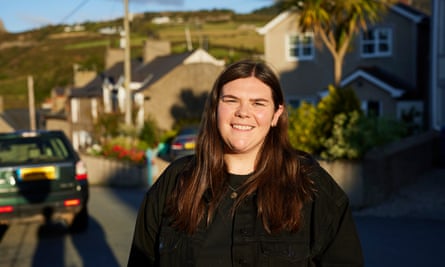 View image in fullscreenMared Llywelyn Williams, who had no choice but to move back in with her family. Photograph: Christopher Thomond/The Guardian
View image in fullscreenMared Llywelyn Williams, who had no choice but to move back in with her family. Photograph: Christopher Thomond/The Guardian
The Labour-led Welsh government seems to have heeded warnings like this and, working with Plaid Cymru, is bringing in an extraordinary raft of measures designed to stop communities such as Morfa Nefyn, a Welsh-speaking heartland, being hollowed out.
From next year, councils will be able to raise discretionary council tax premiums for second homes to 300% – so a £1,000 bill for a permanent resident would be £4,000 for a second-home owner. The government is also tightening the rules to ensure these owners cannot avoid the hefty tax by renting houses out as holiday lets for relatively short amounts of time, and plans to introduce a licensing scheme for holiday homes. Councils in second-home hotspots are to be allowed to apply to the Welsh government to increase land transaction tax – the Welsh equivalent of England’s stamp duty – to dampen prices.
This week it set the wheels in motion for a scheme to give local authorities the option to classify homes as primary residences, second homes or holiday lets. An owner would need planning permission to change a property’s classification from a primary residence to a second home, which the government hopes will help keep more properties available for local people.
The first minister, Mark Drakeford, said this was the “most radical” of the measures. “It would be a very significant intervention in the marketplace and probably represent the biggest intrusion in the way people conduct their affairs,” he told the Guardian. “If a property can only be sold as a primary residence, it is much more likely to go to a local person. Local buyers will have extra protection.”
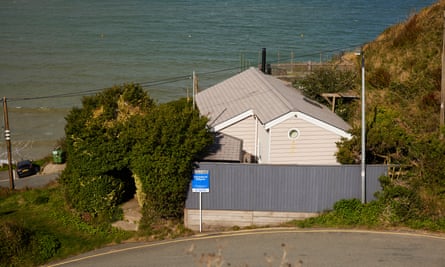 View image in fullscreenA house for sale in Morfa Nefyn. Photograph: Christopher Thomond/The Guardian
View image in fullscreenA house for sale in Morfa Nefyn. Photograph: Christopher Thomond/The Guardian
Drakeford describes the approach as “many-stranded”: “No single policy intervention will make a difference in those communities where the concentration of second homes risks changing the character.”
At the recent Labour party conference, Wales’s plans attracted the attention of leaders from other parts of the UK with second-home issues, such as the Lake District and Yorkshire.
Arguably, the Welsh situation is even more dire because the loss of homes for local people puts at risk a country’s culture and language. Hotspots that are most under threat tend to be Welsh-language strongholds, such as in Pembrokeshire and Gwynedd where 40% of properties in some places are second homes or holiday lets.
Drakeford rejects the notion that the policies are anti-English. “It’s a myth that this is about stopping people from other places. Anyone who is Welsh will be just as affected by these rules. It’s palpably not about outsiders, about keeping people out. It is about making sure we have balanced communities, where young people have a fighting chance. It protects the interests of local people and protects the character of the area. Otherwise the nature of the communities is fundamentally altered.”
Some believe it is too late for villages such as Abersoch on the other coast of Pen Llŷn, from where young families have vanished, leading to the primary school closing in December because only seven pupils remained. Drakeford, however, refuses to believe any places are lost. “All communities are dynamic. I wouldn’t talk myself into a neo-determinism that it’s all too late. The character of those places may change again.”
A fear is that Morfa Nefyn could be the “next Abersoch”. At this time of year, driving towards Nefyn golf club into the prettier end of the village at night, perhaps only half the houses have lights on and cars on the drive; the rest are unoccupied second or holiday homes.
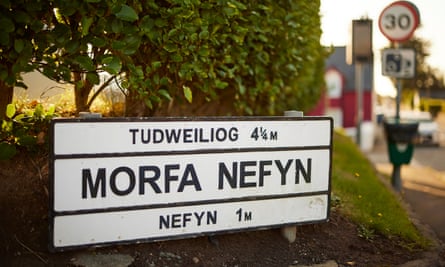 View image in fullscreenMorfa Nefyn has a high proportion of second homes and holiday lets. Photograph: Christopher Thomond/The Guardian
View image in fullscreenMorfa Nefyn has a high proportion of second homes and holiday lets. Photograph: Christopher Thomond/The Guardian
The village has long been a nationalist stronghold and the second-home crisis may help the cause. “Yes Cymru” stickers are dotted around and a sign demanding “no more second homes” greets visitors. Some residents are planning to head to Cardiff this weekend for an independence march.
Plaid Cymru’s leader at Westminster, Liz Saville Roberts, who has lived in the village for 30 years, backs the Welsh government measures and is also pleased Gwynedd council has bought land in Morfa Nefyn to build homes for villagers. It intends to rent them out or offer them for sale on a shared equity scheme.
Saville Roberts’s twin 30-year-old daughters cannot afford to buy here. One lives in a caravan next to the family home, the other has moved 20 miles up the coast to Caernarfon, where property is more affordable. “That experience is so typical,” she says.
The idea that the new policies are aimed at keeping people out is a “very English perception”: “It’s about how we are trying to keep these communities alive.” Saville Roberts says tourists are wanted and needed, “but we need to do it in a way that is mutually beneficial”.
skip past newsletter promotion
Sign up to First Edition
Free daily newsletter
Our morning email breaks down the key stories of the day, telling you what’s happening and why it matters
Enter your email address Enter your email address Sign upPrivacy Notice: Newsletters may contain info about charities, online ads, and content funded by outside parties. For more information see our Privacy Policy. We use Google reCaptcha to protect our website and the Google Privacy Policy and Terms of Service apply.
after newsletter promotion
 View image in fullscreenA mural in Nefyn. Photograph: Christopher Thomond/The Guardian
View image in fullscreenA mural in Nefyn. Photograph: Christopher Thomond/The Guardian
Still, the plans have many critics.
Janet Finch-Saunders, who speaks on housing for the Tories in the Senedd, the Welsh parliament, says Labour and Plaid are “anti-tourist, anti-business and anti-ambition”, adding: “Second-home owners do a lot for the economy. They spend money in restaurants, shops, hairdressers. The government should be focusing not on second-home owners but bringing the thousands of empty homes back into use.”
Saunders said the second-home policies – coming at the same time as a consultation on bringing in a “tourism tax”, were putting people off Wales. “I’m hearing people who have holidayed in my constituency [Aberconwy in north Wales] for years saying: ‘I think we’re going to the Lake District next time because it’s getting hostile in Wales.’”
Suzy Davies, the chair of the Wales Tourism Alliance, says the cumulative effect of these moves is “overwhelming” for small businesses. “There is genuine sadness in the loss of local family businesses which are the key to any future for sustainable communities, in the loss of jobs which keep young people in our communities, in the loss of sources of income in parts of Wales where options are few, in the flood of anxiety and mental health reports we are receiving.”
Sue Kelly, an Englishwoman who owns a company that manages 300 holiday homes on Pen Llŷn, says she believes tensions are building. She has lived and worked in the area since 2004 but is planning to move back to Cheshire. “I don’t feel welcome any more.”
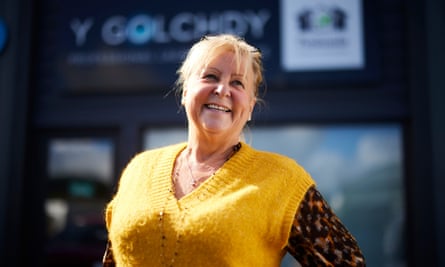 View image in fullscreenSue Kelly in Morfa Nefyn. Photograph: Christopher Thomond/The Guardian
View image in fullscreenSue Kelly in Morfa Nefyn. Photograph: Christopher Thomond/The Guardian
Kelly says businesses struggle to get enough staff. She has heard of people living in motorhomes, cars and illegal dormitories. But she says the policies risk driving “real” second-home owners out to be replaced not by local people but by investors with deep enough pockets to pay the large council tax bills and fund lawyers to get round planning restrictions.
Stuart Webley, the owner of the Tŷ Coch Inn on the beach below the golf club, sees both sides. “I know families with second homes who have been coming here for generations and will be hit by things like the 300% council tax. But I also know people who have bought up four properties and are never here. Striking the balance is the challenge.”
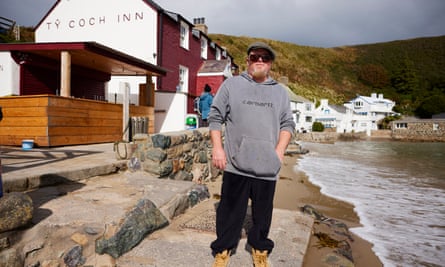 View image in fullscreenStuart Webley in front of the Tŷ Coch Inn. Photograph: Christopher Thomond/The Guardian
View image in fullscreenStuart Webley in front of the Tŷ Coch Inn. Photograph: Christopher Thomond/The Guardian
Mabon ap Gwynfor, the housing spokesperson for Plaid Cymru in the Senedd, says tackling the second-home crisis was a red line when the nationalist party signed up to the cooperation agreement with Labour. He calls the raft of changes “groundbreaking”. While other countries, such as Switzerland and New Zealand, have tough ownership laws, “I don’t know of anywhere else that has taken so many steps in one go”.
He says he is calling for owners not to complain about the measures but rather think about the morality of having a holiday house when so many people have no home at all. His vision of a place like Morfa Nefyn in 20 years’ time? “A place where local people have the right to live and where visitors can come and hear the Welsh language spoken by everyone from babes to the elderly.”






Leave a Reply
You must be logged in to post a comment.